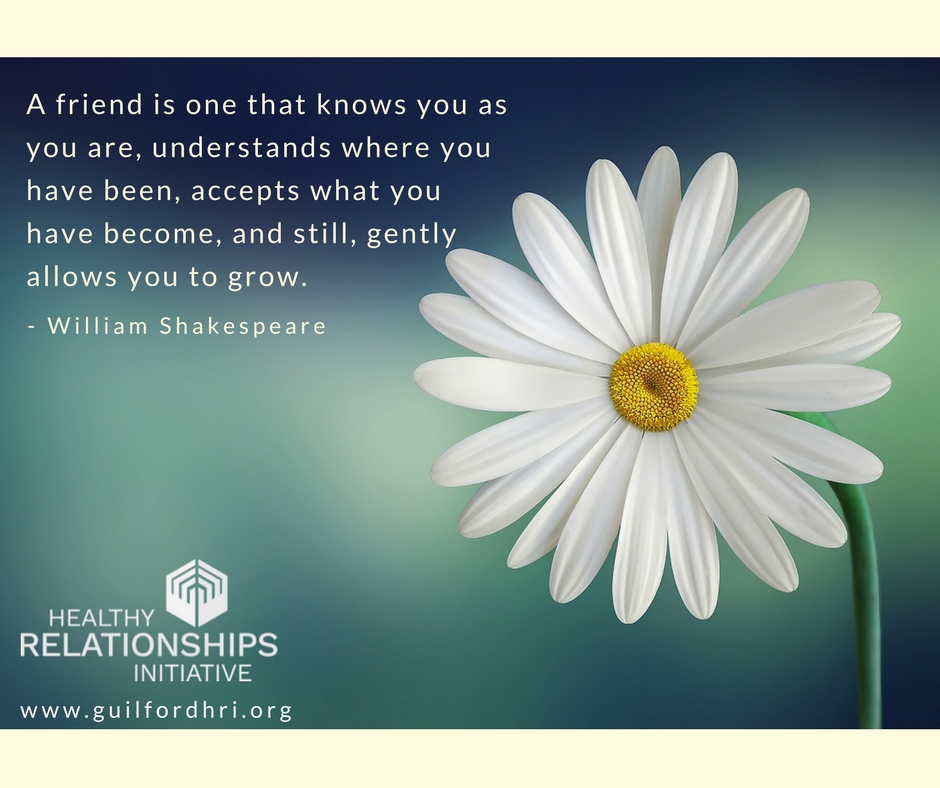
In Times of Trouble

A Real Friend
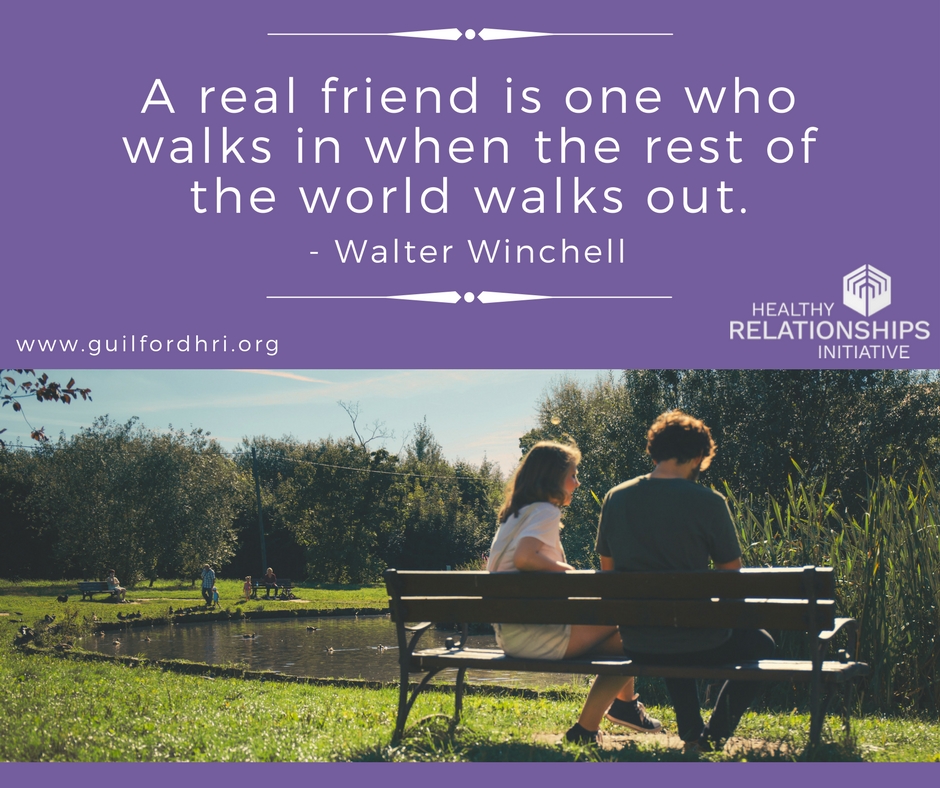
The Friend Who Holds Your Hand
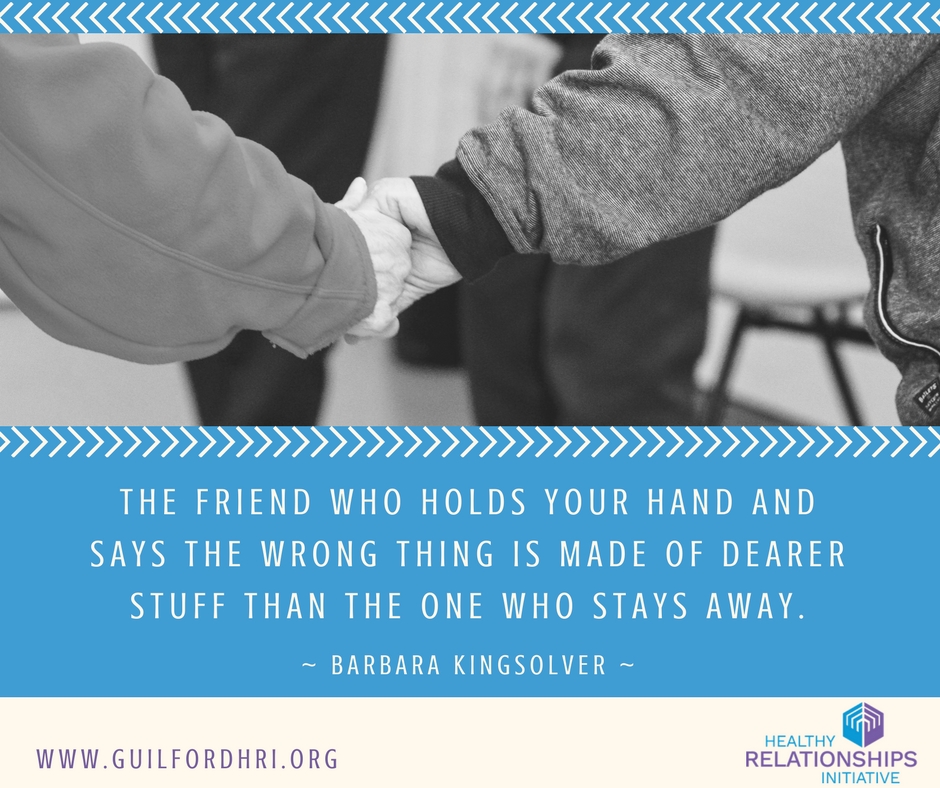
Nothing Better Than A Friend
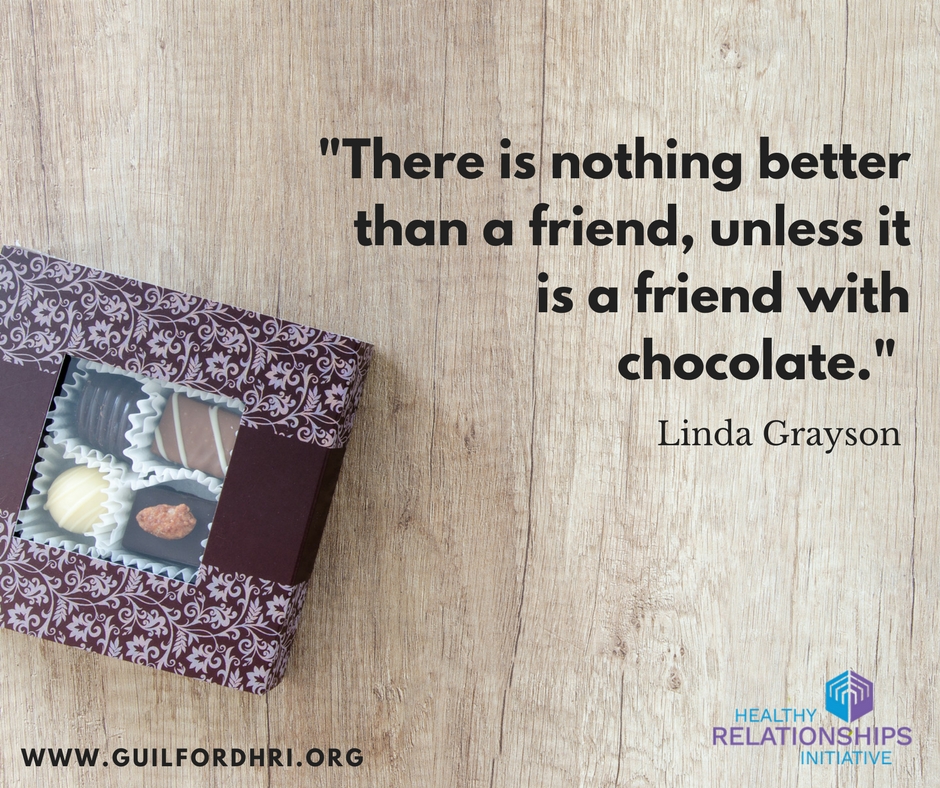
Thankful for Friendship!

With Thanksgiving quickly approaching, this week at HRI we are thankful for one of the most treasured of all relationships in life: friendship. All week, we’ll share some of our favorite quotes about friendship. Share the quotes that resonate with you with your own treasured friends!
In Gratitude to Guilford County Veterans and Their Families
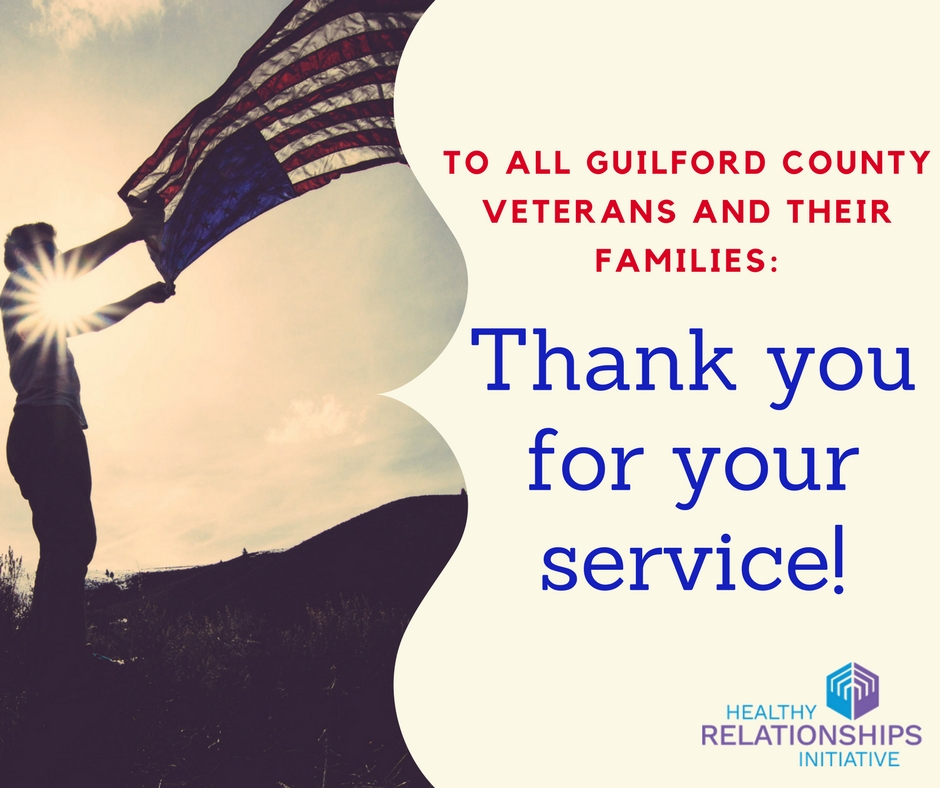
This Veteran’s Day, we give thanks to all Guilford County veterans and their families. Thank you for your service to our community and to our country.
#FindHelpFriday: The Servant Center

By Shanna Reece, Executive Director of The Servant Center
As I walk into Servant House and see a shelter full of veterans experiencing homelessness and think to myself, how can this be? How can these American heroes have nowhere to live? While everyone’s story is different and while most veterans do not have PTSD, a study by Yale reports that the vast majority of homeless Iraq and Afghanistan veterans have been diagnosed with PTSD. This is primarily attributed to multiple deployments. Those that suffer from PTSD have difficulty building and maintaining relationships, as well as keeping jobs. That, in addition to the stigma of mental illness in general, often keeps veterans from seeking needed services. One veteran explained it this way “I believe the reason for many veterans’ reluctance to receive help, on the internet or in the office has to do with the inherent denial of PTSD coupled with the stigma attached. We survived the most intense environment that a human can endure; combat, killing and mayhem. How can we succumb to an unseen foe? Unimaginable and enduring ghosts that chase us unrelentingly, a perfect machination for denial.” (PTSD: A Soldier’s Perspective)
The impact of undiagnosed and/or untreated PTSD can be devastating. Dr. Michele Spoont, a clinical and research psychologist at the Minneapolis VA Health Care System reports that “they are more likely to have failed marriages, be indigent, and have a number of medical problems. It’s one of those things that cascades over time. You lose your job. Your marriage falls apart, and it just accumulates.” And, yes some become homeless.
The Servant Center is here to help those veterans who have fallen onto hard times. The Servant Center is a nonprofit agency in Greensboro, N.C. whose mission is to empower the homeless and disabled, particularly veterans, to become independent, contributing members of our community through housing, healthcare and restorative services. The Servant Center has been working with veterans with mental health and medical disabilities for 25 years in a variety of capacities. First, The Servant Center operates a 21-bed respite program, called Servant House, for veterans experiencing homelessness that have significant mental health and or physical disabilities. The program provides for their basic needs such as housing, food and transportation; but also provides services that are designed to increase their ability to live independently. Nursing staff help resident stabilize medically by helping to schedule medical and mental health appointments, educating them on their conditions, instructing them on how to take their medications and providing crisis response to medical emergencies. The Case Management staff focus on helping the veterans access VA benefits or SSI/SSDI benefits; as well as finding and securing permanent housing. In addition, The Servant Center has two permanent supportive housing units with 17 apartments targeted to veterans from Servant House with disabilities that are experiencing homelessness. Case Management staff is available 5 days a week to help them overcome obstacles to maintaining permanent housing.
More than 90% of veterans who are in the Servant House program transition to permanent housing. One of the key reasons the Servant House program is so successful is that social support from other veterans is built into the program. Many of the veterans served at Servant House have burnt bridges over time due to behavioral or substance abuse issues linked to their PTSD or other mental illnesses and therefore have a shallow social support system. An article in VA Research Trends (April 24, 2014) talks about how important social support is to successful treatment. Spoont says “If someone is having problems, the first thing they tend to do is go to their peer group for advice. We wondered how much effect the response of that network would be, and, as it turned out, the influence factor was extremely high.”
Now I walk through Servant House and see these American heroes who have an opportunity for a second chance.
However, we cannot do it alone, we rely upon the community to help provide these opportunities – we need volunteers and donors who will partner with us to provide those second chances. If you are interested in helping us, please contact Stacey Kyser at 336-275-8585 x 304 or skyser@theservantcenter.org.

 Shanna Reece has spent the last 20+ years serving non-profit and government agencies throughout Greensboro, North Carolina. She has assisted these entities with program development, implementation and analysis of needs assessments, program evaluation, partnership development and grant writing. Currently, Shanna serves as the Executive Director of The Servant Center where she oversees five programs, is the co-Chair of the Stand Down Committee, a co-founder of the Triad Veterans Coalition, serves as Board member for Partners Ending Homelessness and serves on the Nonprofit Management Advisory Board for UNCG’s MPA program. In addition, she is on the Homeless Steering Committee for the Healthcare for Homeless Veterans program at the Salisbury VA. Shanna lives in Greensboro, NC with her husband and 16-year-old daughter Reagan, who aspires to be a Nurse. Her son Wilson is a Marine stationed at Camp Lejeune.
Shanna Reece has spent the last 20+ years serving non-profit and government agencies throughout Greensboro, North Carolina. She has assisted these entities with program development, implementation and analysis of needs assessments, program evaluation, partnership development and grant writing. Currently, Shanna serves as the Executive Director of The Servant Center where she oversees five programs, is the co-Chair of the Stand Down Committee, a co-founder of the Triad Veterans Coalition, serves as Board member for Partners Ending Homelessness and serves on the Nonprofit Management Advisory Board for UNCG’s MPA program. In addition, she is on the Homeless Steering Committee for the Healthcare for Homeless Veterans program at the Salisbury VA. Shanna lives in Greensboro, NC with her husband and 16-year-old daughter Reagan, who aspires to be a Nurse. Her son Wilson is a Marine stationed at Camp Lejeune.
Student Veterans in Higher Education
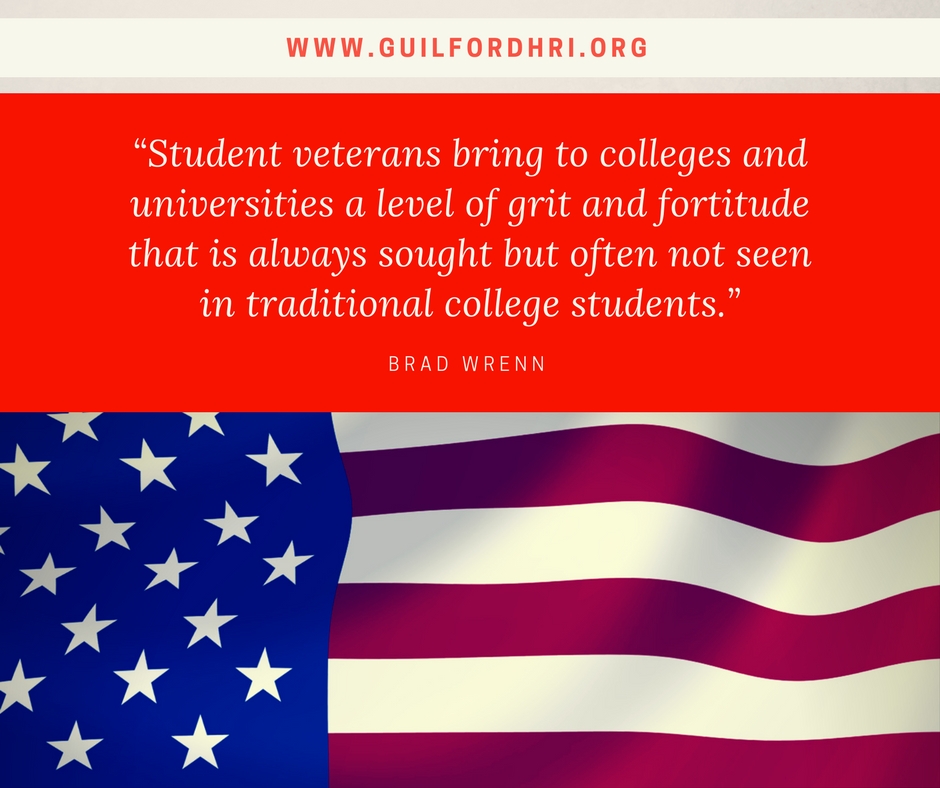
By Brad Wrenn, Coordinator of the UNCG Veterans Resource Center
Making the transition into higher education is an exciting and challenging experience for everyone, but students who are coming to college after serving on active duty in the armed forces bring with them a unique set of both challenges and opportunities for the students themselves, for their families, and for the institutions they attend.
Regardless of how long a person is enlisted or commissioned in the military, upon their separation or discharge, most service members are granted Veterans Affairs education benefits that provide them with financial assistance for college in the form of paid tuition, tuition assistance, or monthly stipends. Some benefits packages allow military-affiliated students to pay in-state tuition at any public institution of higher learning in the nation regardless of their home of record. Some VA benefits can even be transferred to the children and spouses of service members. While these education benefits facilitate the transition from military to academic life, they can also cause several challenges for veterans that traditional students do not experience. For instance, VA benefits only pay for classes that are directly related to the plan of study for a student’s stated major. This means that military-affiliated students have fewer opportunities to explore potential areas of interest and must develop a comprehensive graduation plan early on in their college careers. Also, all education benefits packages must be processed through a myriad of systems both within the VA and the higher education institutions they attend. Because of this, many students experience delays in the payment of their benefits and must take extra steps with their school’s administration to ensure that they are not dropped from their classes each semester.
In addition to these issues, some service members face significant personal and social struggles when making the choice to pursue a college degree. For these student veterans, particularly for those who have separated recently, the lifestyle associated with the higher education environment is quite different from what they have become accustomed to in the military. Student veterans often feel that they have very little in common with their civilian student peers, and sometimes have trouble making meaningful social connections on campus. Furthermore, because of their experiences in the military and in combat, student veterans sometimes have unique perspectives about certain socio-political situations or topics that their traditional classmates have trouble understanding. This causes the veterans to either withdraw from these discussions entirely so as not to create confrontations, or to express their opinions in a very overt way that civilian classmates might find insensitive or offensive. In either case, student veterans often feel isolated and stigmatized in the classroom.
Adding to this isolation is the fact that student veterans are also far more likely than traditional students to live off-campus and have obligations outside of school related to jobs and families. This causes significant difficulty with time management and results in student veterans being far less likely to take part in extracurricular activities such as student groups, trips, team sports.
Finally, many student veterans face service-related injuries or illnesses that can complicate their transition to academia. One such condition that can directly and significantly affect the college experience for service members, particularly those who have experienced combat, is post-traumatic stress. The symptoms of post traumatic stress can include sleep difficulties, hypervigilance or hyperarousal, and discomfort with large groups of people. Another somewhat common service-related condition is Traumatic Brain Injury. These injuries involve physiological damage to the brain, and can hinder skills such as memorization, concentration, and attention maintenance, making it difficult for students to focus on assignments and exams, and sometimes causing them to accumulate excessive absences.
Despite these challenges, the military provides student veterans with tremendously important life skills such as strong core values, discipline, leadership, teamwork skills, and the ability to perform under stress. Student veterans bring to colleges and universities a level of grit and fortitude that is always sought but often not seen in traditional college students. They usually retain and persist at a higher rate than their civilian counterparts and typically maintain a higher than average GPA. For this reason, it is extremely important for higher education institutions to ensure that they have the systems, the knowledge, and the understanding necessary to provide the highest level of service to this community of students who have offered their own service in defense of our nation.
 Brad Wrenn is the Coordinator of the Veterans Resource Center at The University of North Carolina at Greensboro. After being honorably discharged from the United States Air Force in 2002, Brad earned a Bachelor’s Degree in International Business from The University of North Carolina at Greensboro and a Master’s Degree in Adult Education from East Carolina University. He currently lives in Greensboro with his wife Rachel and their two dogs, Karma and Levi, and he enjoys backpacking, gardening, and beekeeping in his spare time.
Brad Wrenn is the Coordinator of the Veterans Resource Center at The University of North Carolina at Greensboro. After being honorably discharged from the United States Air Force in 2002, Brad earned a Bachelor’s Degree in International Business from The University of North Carolina at Greensboro and a Master’s Degree in Adult Education from East Carolina University. He currently lives in Greensboro with his wife Rachel and their two dogs, Karma and Levi, and he enjoys backpacking, gardening, and beekeeping in his spare time.
Challenges and Supports for Military Families

By Lindsey Jefferies
If I asked you to name an organization that that directly impacts an employee’s family just as much as the actual employee, I bet I could guess what you would say. Law enforcement and the military are occupations that come to mind with regards to heavy impacts on the family. As a 12-year service member myself, I can attest to the heavy weight carried by both my family members and the families of my Soldiers. You could probably imagine that the separation caused by annual trainings, weekend obligations, and deployments place great strain on the family simply due to the separation. However, there are unique challenges that military family members endure in addition to separation and loss.
Over the years, I have come to witness the challenges the spouses and children of service members face when it comes to building and leaving a support system. The friendships, organizations, and occupations that are established by these family members are initially based on the location of the current duty station. These families are faced with the challenge of overcoming the dismantling of those bonds when they are uprooted and reassigned to a new location. This is a challenge recognized by the Army. In my experience, the establishment of the Family Readiness Program, the Army’s Morale, Welfare, and Recreation (MWR) program, and the Army One Source were intentional efforts to increase availability of support systems, family involvement and wellbeing, and the overall resilience of the military family. The Education and Employment program of the NC National Guard (NCNG) was developed to assist military family members and Soldiers with gaining fulltime employment and education assistance or guidance.
As you are considering the different challenges military families might face, the effects of Post-Traumatic Stress Disorder (PTSD) and Military Sexual Trauma (MST) may be a few of the considerations that come to mind. When it comes to mental health, I know firsthand the services that are available to the NCNG specifically because I desire to work directly with military families in NC after I am a Licensed Professional Counselor. The Integrated Behavioral Health Services (IBHS) for the NCNG is an all-inclusive system that provides free direct counseling and assistance for National Guardsmen and their families. The assistance can range from individual and family counseling, suicide hotline, crisis intervention, Traumatic Event management, and Critical Incident Stress Debriefing.
As a National Guard Soldier, my duty is to serve my state and country. There is an added sense of comfort given to me because as I serve, I know that my family and the families of my fellow Soldiers are taken care of as they face the unique challenges of military families.
 Lindsey Jefferies is a 29-year-old Raleigh native currently serving as a 1st Lieutenant in the NC Army National Guard. She holds the position of Platoon Leader and is a Blackhawk Pilot as her Military Occupational Specialty. Lindsey is completing her 2nd year of her Master’s Degree in Couple and Family Counseling at the University of North Carolina at Greensboro. Upon completion of her degree, she aspires to work directly with military families.
Lindsey Jefferies is a 29-year-old Raleigh native currently serving as a 1st Lieutenant in the NC Army National Guard. She holds the position of Platoon Leader and is a Blackhawk Pilot as her Military Occupational Specialty. Lindsey is completing her 2nd year of her Master’s Degree in Couple and Family Counseling at the University of North Carolina at Greensboro. Upon completion of her degree, she aspires to work directly with military families.
